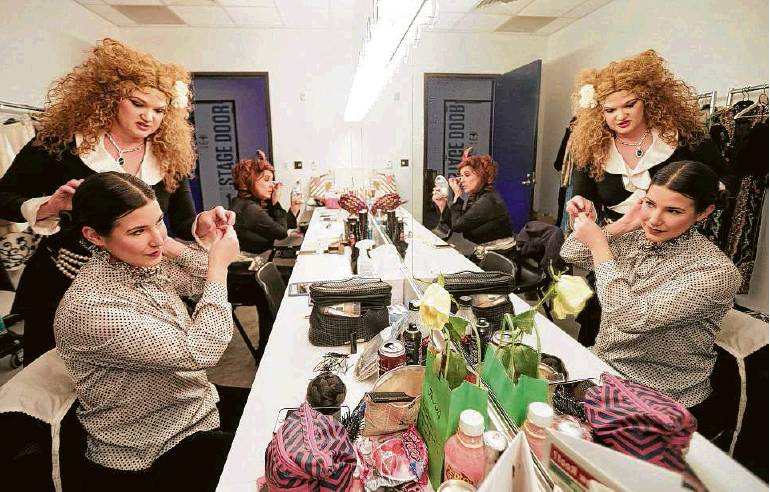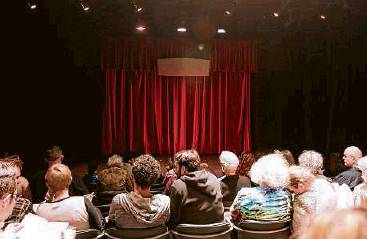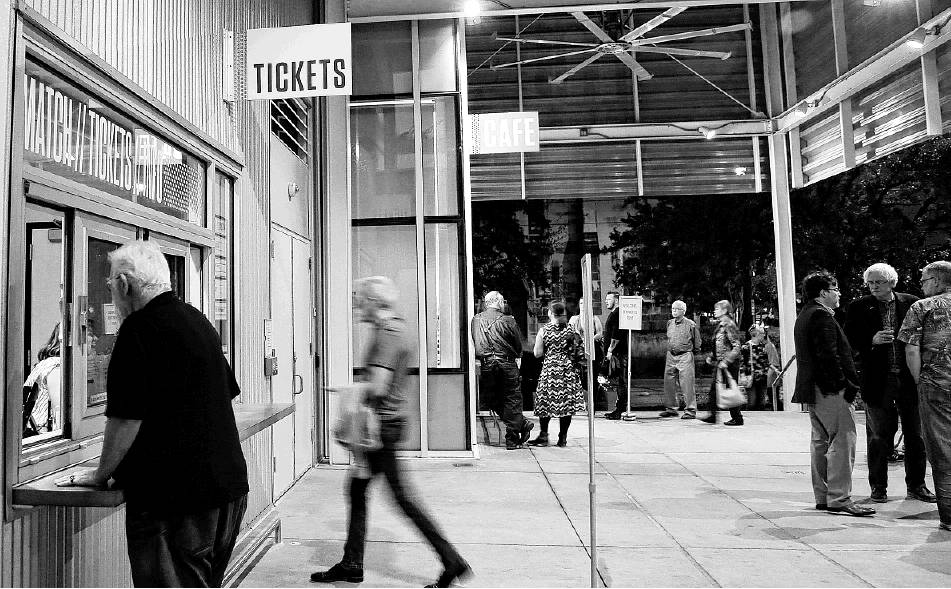Small theaters face final curtain call
Dwindling donations, rising rents force troupes to fight for survival
By Wei-Huan Chen STAFF WRITER
For its last performance, Horse Head Theatre Co. decided to go morbid. In early February, the group staged “We’re Gonna Die,” the title not only a reference to humanity’s fate but also an acknowledgment that, after a decade of surviving as an organization, it now must shut down.
Horse Head Theatre, considered one of Houston’s more daring professional theater companies, was hit last year with a dismal financial reality: the lack of public grants and insufficient individual donations.
“There’s no money, so there’s not going to be art,” said Jacey Little, the company’s artistic director. “It’s really depressing. But that’s the reality.”
Horse Head ended operations earlier this month. But it was far from an isolated case. Many other small theater companies in Houston are also fighting for survival, battling gentrification, donor apathy and increasingly competitive public grants.
In the past two years, one other professional company, 4th Wall Theatre, has announced its closure — before being rescued by a donor.
Three others — Mildred’s Umbrella, Landing Theatre and Classical Theatre Co. —have been forced out from their homes. Established mid-tier theaters are seeing no growth. Rents inside the loop continue to rise, while revenue and fundraising have plateaued.
If theaters like these continue to shutter, it would be an enormous blow to the performing arts in Houston, leaving the scene without the vital second-rung of talent to supplement what’s available on the better-funded main stages. The trends have raised concerns among local artists.
“Small to mid-size companies can no longer survive in this climate,” said Matt Hune, artistic director of Rec Room, a theater in East Downtown founded in 2016. “We’re seeing dwindling or capped funding, while prices keep rising.”
Searching for ahome
Last December, Mildred’s Umbrella and Classical Theatre Company were forced out of their shared space in the Chelsea Market shopping center near the Museum District. The development was sold, to be torn down and replaced with high-end apartment complexes.
This has left both companies homeless, in a search for space. But the Midtown Arts & Theater Center Houston (MATCH), built in 2015 to address the need of Houston’s smaller galleries, music ensembles, dance companies and theater groups for affordable performance spaces, is at capacity. Studio 101 at Spring Street Studios, Mildred’s Umbrella’s former home, became too expensive after then-co-tenant 4th Wall Theatre temporarily shut down in 2017.
Local theaters sometimes help by renting out their spaces to other companies at a discount — the Alley Theatre is housing Mildred’s Umbrella’s performances for two weeks. But artists say they need a permanent solution.
“Inside the loop, there’s nothing affordable,” said Jennifer Decker, artistic director of Mildred’s Umbrella.
The plight of small theater companies is a vital issue for Houston’s arts scene.
Though the Alley Theatre is the city’s best-known and largest theater company, the city is home to numerous other professional theater companies, many formed in the past decade. These companies provide a significant portion of local artists’ wages.
“Personally, the saddest thing about Horse Head closing was knowing that we employed over 60 artists in the last two years,” Little said.
Smaller companies have also expanded and diversified Houston’s entertainment options in recent years, bringing the works of nationally known playwrights such as Ike Holter, Young Jean Lee, Annie Baker, Christopher Chen, Ayad Akhtar and Robert O’Hara to Houston. These writers are considered to be leading American theater’s cutting edge, whose voices wouldn’t be heard locally without small companies.
Keeping talent in Houston
Many consider a “secondary” arts market an integral part of any major metropolitan area’s cultural industry.
Small to mid-size theaters can offer cheaper prices and more intimate venues, providing a gateway for new audiences. These companies also give lighting designers, carpenters, costume designers and stage managers a reason to stay and work in Houston, rather than forcing professionals to move to a larger market such as Chicago or New York City.
But today, artists at smaller companies take major sacrifices to keep their companies running. Little quit her full-time job with benefits to become Horse Head’s artistic director, so that the company was eligible for funding.
Decker, like many other artists, teaches full time and pours her extra income into her company while working for free. Hune, a teacher at Kinder High School for the Performing and Visual Arts, said Rec Room survives mainly because its landlord supports its vision and offers the company affordable rent.
Theaters face challenges in the current economic climate. Fundraising remains an issue in a post-Harvey environment — some local organizations still struggle to reach the levels of attendance they had before the storm, said Deborah McNulty, director of cultural affairs for the city of Houston.
Another factor: theater companies have risen vastly in numbers in the past decade, while audiences and funds haven’t gone up, McNulty said.
“It’s hard to start a new nonprofit these days,” she said, citing the infrastructure costs of maintaining nonprofit status as a major financial barrier for smaller companies. “You’re not just competing with other theaters. You’re competing with everything.”
Distribution of wealth
But many artists say the biggest obstacle in Houston is that audiences and donors don’t value the city’s arts scene beyond the Theater District, a place that is often proclaimed as the second largest such district in the U.S. after New York City in terms of the number of seats in a concentrated downtown area.
According to MATCH, Houston has been cited as the country’s second most philanthropic city, giving $600 million to cultural institutions a year.
But the vast majority of that money — around 90 percent — goes to 5 percent of the arts organizations, primarily to the city’s eight biggest arts groups.
In other words: Houston has a vastly top-heavy distribution of philanthropic dollars, culminating in a climate that leaves the bulk of organizations fighting over a small slice of the charity pie.
“I hope the funders look around and not just focus on the big organizations,” said David Rainey, artistic director of the Landing Theater, which left its permanent theater space in the Near Northside in 2017 due to lack of funding. Like Mildred’s Umbrella and Classical Theatre Co., the Landing Theatre is currently a “gypsy theater” — a company without a permanent home that must reserve spaces on a case-by-case basis.
“To get to a level of sustainability is a Herculean effort. You need a strong fundraising board, a strong buy-in, strong financial support from the community,” said Shayna Schlosberg, managing director of the Catastrophic Theatre, which has a 25-year history.
But Schlosberg said even they struggle to pay the bills each month. No one is immune to the brutal economics of running a theater.
For these companies to thrive, the city needs a change in culture, said Rainey.
“We have a thriving arts community. We need to support it so the companies aren’t shutting down, which is happening because the road is too hard, when year after year you’re met with just more struggle,” said Rainey. “It doesn’t have to be this way. Things can change.” wchen@chron.com


